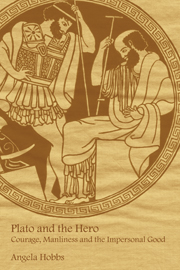Book contents
- Frontmatter
- Contents
- Acknowledgements
- Preface
- Glossary
- 1 The puzzle of Plato's thumos
- 2 Thumos, andreia and the ethics of flourishing
- 3 Arms and the man: andreia in the Laches
- 4 Odd virtue out: courage and goodness in the Protagoras
- 5 Why should I be good? Callicles, Thrasymachus and the egoist challenge
- 6 Heroes and role models: the Apology, Hippias Major and Hippias Minor
- 7 The threat of Achilles
- 8 Plato's response: the valuable as one
- 9 Alcibiades' revenge: thumos in the Symposium
- Epilogue: The weaver's art: andreia in the Politicus and Laws
- Bibliography
- Index
4 - Odd virtue out: courage and goodness in the Protagoras
Published online by Cambridge University Press: 01 October 2009
- Frontmatter
- Contents
- Acknowledgements
- Preface
- Glossary
- 1 The puzzle of Plato's thumos
- 2 Thumos, andreia and the ethics of flourishing
- 3 Arms and the man: andreia in the Laches
- 4 Odd virtue out: courage and goodness in the Protagoras
- 5 Why should I be good? Callicles, Thrasymachus and the egoist challenge
- 6 Heroes and role models: the Apology, Hippias Major and Hippias Minor
- 7 The threat of Achilles
- 8 Plato's response: the valuable as one
- 9 Alcibiades' revenge: thumos in the Symposium
- Epilogue: The weaver's art: andreia in the Politicus and Laws
- Bibliography
- Index
Summary
VIRTUE AND THE VIRTUES (328d–334c)
The complexity of the relation between andreia and aretē as a whole is first raised in the Protagoras at 329e. At 328d Protagoras finally brings his Great Speech to a close and Socrates offers his praise; there is, however, just one point he would like clarified. Protagoras made reference to both particular virtues, such as justice, respect and temperance, and also to virtue (aretē) in general; does he see the former as parts of virtue, or are they simply different names for the same single thing? Protagoras replies that they are parts. In that case, continues Socrates, are they heterogeneous in the way that eyes, ears and nose are parts of the face, or are they homogeneous like the parts of a lump of gold? Protagoras says that they are like the parts of the face. And do different people possess different virtues, or is it the case (as the analogy would seem to suggest) that if you possess one virtue you must necessarily possess them all? No, says Protagoras, many people are courageous (andreioi) but unjust, and many again are just but not wise (329e5–6).
If we leave aside for the moment the issue of what precisely Socrates means when he suggests that the virtues are names of the same thing, the most striking features of this exchange are Protagoras' immediate citation of andreia as problematic, and his belief that justice may be divorced from wisdom.
- Type
- Chapter
- Information
- Plato and the HeroCourage, Manliness and the Impersonal Good, pp. 113 - 136Publisher: Cambridge University PressPrint publication year: 2000



